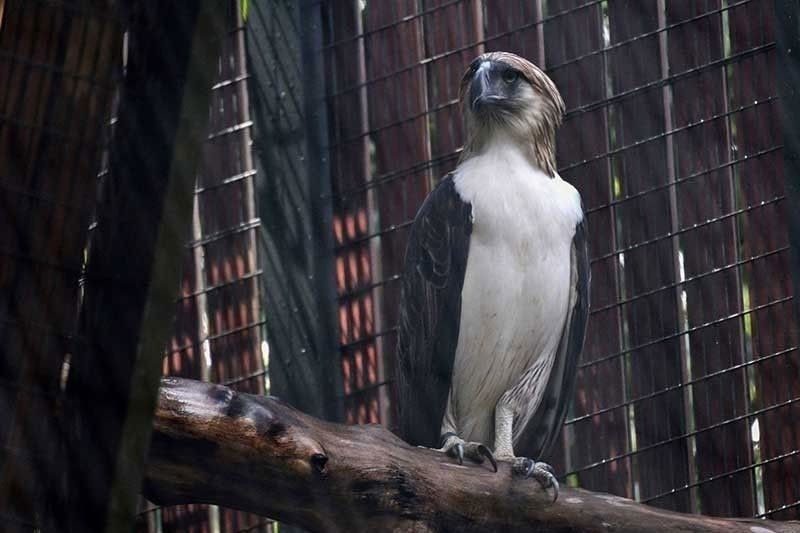All Philippine eagles face threat of habitat destruction – UNODC

MANILA, Philippines — All eagle species in the Philippines face the threat of habitat destruction due to deforestation for agriculture, livestock and logging purposes, and are equally susceptible to poaching, according to the United Nations Office on Drugs and Crime (UNODC).
The UNODC cited an undercover operation in Pampanga in July last year, led by the Philippine National Police-Maritime Group (PNP-MG), that resulted in the confiscation of a Philippine serpent eagle and the arrest of several suspects who were attempting to sell the bird, which had been advertised in an online buy-and-sell group chat.
The Philippine serpent eagle is categorized as a “least concern” species, according to the International Union for the Conservation of Nature’s Red List.
It is important to note, however, that its population trend is on a decline, leading to its inclusion under Appendix II of the Convention on International Trade in Endangered Species of Wild Fauna and Flora (CITES).
“This worrisome trend mirrors the challenges faced by other eagle species in the Philippines, all of which are equally susceptible to poaching,” the UNODC said.
“For instance, the Philippine eagle is listed as ‘critically endangered,’ and the hawk eagle is categorized as ‘endangered,’ both suffering from illegal wildlife trade,” the agency added.
The trading and possession of wildlife, including their by-products and derivatives, are explicitly prohibited under Republic Act 9147, or the Philippine Wildlife Resources Conservation and Protection Act.
“The law serves to safeguard the abundant natural wealth of the Philippines, a nation acknowledged as one of the world’s 18 mega-diverse countries, containing between 70 and 80 percent of the world’s plant and animal species,” the UNODC said.
“Yet this astounding biodiversity has also helped make the Philippines a source, transit point, and destination for the illegal trafficking of poached wildlife,” it added.
Through the removal of key species, the illegal wildlife trade is severely impacting ecosystems and altering predator-prey relationships, according to the agency.
“With their majestic appearance and status as symbols of strength and pride, eagles are often a target of wildlife traffickers,” it said.
The UNODC also observed that traffickers mostly trade eagles to private collectors, to be kept as pets, or they are sold to zoos.
“As in this case, wildlife is often advertised online, a trend that has increased over the last years, especially during the COVID-19 pandemic. The anonymity of the web makes it difficult for law enforcers to identify the numerous advertisements and the real-life identities of the sellers,” it said.
Philippine law enforcement agencies, however, have made significant progress in combating wildlife crime, thanks to an advisory program launched in 2021 by the UNODC, with support from the US Bureau of International Narcotics and Law Enforcement Affairs.
The program brings together a diverse group of agencies representing different areas of expertise and authority, including the police, customs, wildlife authorities and prosecution services.
During the advisory meetings, the agencies discuss case development for recent arrests and seizures and devise strategies to execute joint operations and investigations.
The UNODC provides agencies with information on specialized investigation techniques and mentoring aimed at sharing international best practices relevant to the Philippines.
The advisory program has contributed to more effective operations conducted by law enforcement authorities, with PNP-MG’s Col. Oliver Tanseco crediting the success of the operations to the improved collaboration, information sharing and joint planning among participating agencies.
“Several of the operations were carried out jointly with our partners in the program, including the Palawan Council for Sustainable Development and several regional offices of the Department of Environment and Natural Resources. Coordination was seamless due to our shared membership in the Advisory Program and our regular interactions,” Tanseco said.
Last year, the PNP-MG conducted a staggering 852 operations related to violations to the country’s Wildlife Act, a four-fold increase from the 169 operations in 2021.
The increase was partly attributed to a higher demand for wildlife as “exotic” pets, a surge in social media posts and groups promoting the keeping of exotic wildlife as pets, and the unwitting involvement of ride-sharing and delivery companies in the transport of illegally traded wildlife.
The advisory program has also put a spotlight on the emerging and pervasive problem of wildlife trafficking.
“Through our exposure in the Advisory Program, we have come to fully grasp the ecological imbalance caused by this illegal trade and its dire consequences on human health, development, and well-being. It’s a grave matter that demands our attention and, consequently, our decisive action,” Tanseco said.
The UNODC noted that successes have also been seen in Cambodia, the Lao People’s Democratic Republic and Thailand, where the agency also runs similar advisory programs to combat wildlife and forest crime.
The UNODC further supports the capacity of these countries by facilitating access to a variety of equipment crucial for conducting operations and investigations.
The PNP-MG reported that it has transferred a rescued eagle to a wildlife rescue center, where it will undergo rehabilitation. The ultimate goal is to release this magnificent creature back into the wild once it has made a full recovery.
The Philippine serpent eagle is part of the more than 700 wildlife specimens rescued by the PNP-MG.
- Latest
- Trending




























